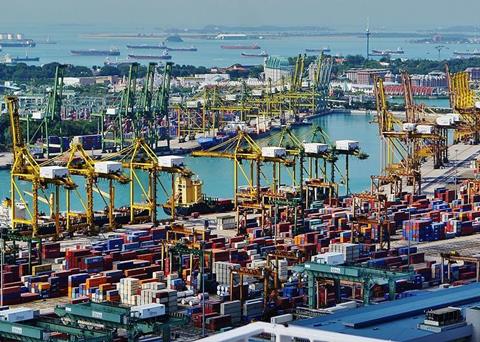At the end of November, Maersk announced it was shuttering TradeLens, the cargo platform co-developed with IBM, which once promised to revolutionise the way cargoes moved around by leveraging the distributed ledger system, blockchain.
TradeLens will finish operation in Q1 2023, a Maersk announcement revealed.
The distributed ledger system was envisioned as a way to cut down on paperwork, shipping’s preferred method of exchanging documents between vessels and ports. It would also provide a trust framework wherein no third party could tamper with documents, making shipments impervious to cargo thefts, smuggling, misdeclaring, and other problems.
Blockchain used to enjoy a reputation as a potential solution to issues in fuel quality, the provenance of biofuels, electronic logbooks, measuring ship emissions, crewing, training, classification and so on. Despite high hopes that blockchain would drive transformational change in business processes by offering security and integrity, wider issues have slowed the expected revolution.
In TradeLens’ case, there was scepticism about its independence from the beginning. How could Maersk – not just any shipping line, but the world’s largest – possibly be considered a neutral party and broker? However, this did not stop Hapag-Lloyd, Ocean Network Express (ONE), CMA CGM and MSC from signing up, not as users of TradeLens, but as trusted partners, or ‘trust anchors’ as they were originally described, pledging to allow cross-compatibility with their own systems.
In 2019, as his company signed up, ONE MD Corporate & Innovation Noriaki Yamaga said that its involvement would give ONE “…opportunity to drive greater innovation across the shipping supply chain,” and “to provide our leadership and insight to help the platform continue to evolve.”
For TradeLens, things progressed well, if a little slower than expected, well into 2020. But as pandemic year 1 drew to a close, something was happening with blockchain. Bitcoin, a cryptocurrency which runs on a blockchain architecture, was beginning to hit the headlines daily, because the price of the coins was skyrocketing, turning early adopters into multi-millionaires.
This put bitcoin, a fundamentally marginal use case for blockchain, at the forefront of its public perception, leading to associations between blockchain and highly speculative consumer behaviour that have continued until the present.
But TradeLens was still not picking up the kind of traction it would need. The nature of the network meant that its usefulness depended on widespread adoption. More than 20 ports had signed up to be part of the network, but that was still too little, and activity remained slow on the customer side. Maersk, meanwhile, was, like other liner giants, becoming a victim of its own success, generating huge profits from its ship operations, but infuriating governments and authorities in the process. TradeLens’ development partner, IBM, had reportedly begun to put further investment in the project on hold.
Meanwhile, as the crypto boom began to bust, the darker side of bitcoin – still the de-facto blockchain focus – became more widely known. These range from concerns about spiralling energy consumption associated with the ‘mining’ of cryptocurrencies, through to the current repercussions from the collapse of crypto-currency exchange FTX Trading.
Through no fault of its own, then, blockchain’s reputation became tarnished by the pump-and-dump silliness of its loudest and most troublesome offshoot. The word ‘blockchain,’ no longer the shareholder magic-dust it had been, started to disappear from companies’ marketing materials. This left only those such as TradeLens, which had actually believed in the technology and attempted to apply its benefits in earnest, to a real-world problem in want of a solution. Tellingly, in late 2021, when DP World launched its own platform to compete with TradeLens, any mention of blockchain was conspicuous by its absence.
In his November post-mortem, Lars Jensen, who left Maersk Line in 2010 and now works as the CEO of consultant Vespucci Maritime, called TradeLens a “child born out of the blockchain hype seen [in 2017].”
It was not an only child, however. GSBN, a Chinese rival to TradeLens which began in 2018, remains extant. Indeed, Jensen does not appear to have condemned blockchain in principle; like Maersk and its partner IBM, he seemed to suggest that it could, in the right hands, bring tremendous value to the maritime industry. “…it is an indication,” he said, “that it is commercial usage which determines the fate of new technological initiatives and not the sophistication of the technology employed.”






